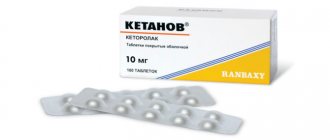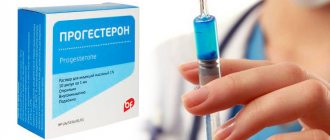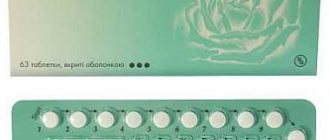Obstetrician-gynecologist, ultrasound doctor, pediatric gynecologist.
Area of professional interests: sexually transmitted infections, cervical diseases, planning and management of pregnancy, contraception, ultrasound diagnostics, gynecology of childhood and adolescence.
Calcium gluconate is a drug that has many therapeutic effects due to its composition. In the process of metabolism in a woman’s body, glucose and calcium are formed from it. These substances are necessary to ensure normal metabolic processes and maintain the function of many organs, including endocrine ones. The product can be used both for preventive purposes to restore reserves and to relieve some acute conditions. How can you use calcium gluconate correctly during menstruation, when will it help?
Read in this article
Effect of the drug
Calcium gluconate is a synthetic drug that contains approximately 9 - 10% calcium in its composition. Available in various forms: 5 ml solution ampoules for intravenous and intramuscular administration, as well as 0.5 g tablets for oral administration. There are special options with added flavors, these are for children. The drug has the following effects:
- anti-inflammatory,
- antiallergic,
- hemostatic,
- increases the strength and stability of the vascular wall,
- can be used for poisoning with certain substances.
Why is calcium needed?
Normal concentrations of this trace element are maintained by the parathyroid hormones - parathyroid hormone and calcitonin. Also, calcium can perform its functions only if there is sufficient vitamin D in the blood.
The main functions in the body that are supported by this trace element:
- Calcium is the basis for building bone tissue. With its deficiency, osteoporosis develops - “softening”, which provokes fractures, problems with the spine, etc.
- This microelement regulates the communication of cells with each other through special calcium channels. Thanks to them, the movement of potassium and sodium is carried out, which ensures many functional processes in the body. In this way, the transmission of nerve impulses to the muscles is coordinated. Therefore, calcium imbalance is one of the causes of seizures.
- This microelement is necessary for the normal supply of energy molecules to muscle fibers for their work.
- Calcium is involved in all blood clotting reactions; it activates many factors. This property is used when calcium gluconate is prescribed for heavy periods to regulate blood loss.
- Calcium also strengthens the walls of blood vessels, which reduces inflammatory and allergic processes. Therefore, in gynecological practice, calcium gluconate is prescribed in complex therapy for infectious processes in the area of the appendages, cavity and cervix.
- Calcium increases vascular tone, which promotes activation of the autonomic nervous system and an increase in blood pressure. This property must be taken into account when prescribing medication.
Why is glucose needed?
The function of this substance can be described in just a few words, but without it no energy processes are possible. Therefore, in case of deficiency, the body processes not only fats into glucose molecules, but also muscle protein and almost all other tissues.
Thus, it is the main source of energy for brain cells. In addition to its energy function, it is involved in protein synthesis and lipid oxidation. And these are the most important processes in the body.
Indications
Calcium gluconate is used to replenish the balance of this trace element in the body. It is also used for all conditions when the need for calcium is increased, or it is not absorbed in sufficient quantities from food. The main indications for its use are as follows:
- Hypocalcemia, dysfunction of the parathyroid glands.
- Osteoporosis, osteomalacia, tetany.
- Rickets (calcium and vitamin D interact very closely; one does not “work” without the other).
- In some cases of chronic renal failure.
- During menopause, to prevent the “leaching” of calcium from bones.
- With long-term use of drugs that promote increased excretion of this microelement (antihypertensive and other drugs).
- In acute and chronic allergic reactions, calcium gluconate stabilizes cell membranes, reducing the processes of cell hypersensitivity.
- For fragility of blood vessels, increased bleeding, to stop bleeding. It is for this purpose that calcium gluconate is used in injections during menstruation. Tablets are not suitable for correcting such conditions.
- For some liver diseases, especially when it is toxic to salts of heavy metals and some acids.
Watch the video about the benefits of calcium:
Admission rules
The regimen and dose should be prescribed by a doctor. Only a specialist, taking into account the person’s health status and all indications for taking the medicine, can recommend an effective and safe method of taking the drug. Standard treatment regimens for adults are as follows:
- Adult women: 1 - 3 tablets (0.5 g) every 8 - 12 hours for 5 - 7 days. The maximum daily dose should in no case exceed 9 g.
- Injection forms (most often the drug is administered intravenously) are prescribed 5-10 ml once a day. Moreover, the injection must be done slowly, over 2 - 3 minutes. In this case, a slight tingling sensation may be felt along the vein.
Use of special designs
One of the alternatives to invasive intervention is the use of special devices for lip augmentation. Today, the Fullips device is popular. The advantage of its use is the ability to use it at any time and the absence of side effects. The small and compact size allows you to carry Fullips with you and use it at any time if necessary.
Externally, the device resembles a regular cap, but due to the special shape of the edges, when used, it does not leave red stripes in the lip area. The manufacturer today produces three varieties:
- large round;
- medium oval;
- small oval.
The choice of Fullips model and application features influence the final result in the form of lip augmentation. If desired, within a few minutes a woman can get her lips in the form of a bow, severe or slight swelling. The procedure looks like this:
- the device is applied tightly to the lips;
- by applying force, air is drawn in as much as possible;
- The device is held on the lips for 30 seconds to 2 minutes.
- Due to the vacuum, the lips are stretched and due to the rush of blood they increase in size.
The duration of the lip augmentation effect depends on the systematic use. When used for the first time, the effect lasts from 15 minutes to 4 hours. With regular use, the duration can be 7 hours.
Why is it used in gynecology?
In gynecological practice, calcium gluconate is also often used.
The drug is used primarily in the complex treatment of various types of bleeding in women: after diagnostic and therapeutic curettage, abortion, endometrial hyperplasia, myomatous nodes, inoperable cancer of the cervix and uterine body, and many other conditions. In these cases, calcium gluconate and ascorutin are often prescribed together, also during menstruation if they are heavy.
Calcium gluconate is one of the first drugs that should be administered intravenously if an acute allergic reaction occurs to any medications used in gynecology, including.
Many doctors include it in treatment regimens for various menstrual cycle disorders, as well as to normalize the processes of follicle maturation and ovulation itself. If you use calcium gluconate for these purposes, the dosage for periods (heavy) will be different here too.
By normalizing muscle contraction, administered calcium can even, to some extent, relieve pain that occurs due to excessive contraction of the uterus during menstruation.
We recommend reading the article about hemostatic drugs for heavy menstruation. From it you will learn about the causes of heavy periods, the prescription of medications to stop bleeding, the effectiveness of drugs such as vikasol, etamsylate, dicinone and others.
What is biorevitalization
Biorevitalization is an injection procedure aimed at increasing the hydration and resourcefulness of the skin. For the procedure, preparations with a high content of hyaluronic acid (HA) are used. Since hyaluronic acid is a natural component found in our skin, HA coming from outside is absorbed organically by the tissues. Replenishing its deficiency increases hydration, improves the protective functions of the skin, and promotes rapid regeneration. Injections of hyaluronic acid prevent pigmentation and ensure healthy metabolism. The concept of “biorevitalization” stands for natural revitalization and revival of the skin.
HA injections are carried out in the face, neck, décolleté, hands, elbows, and intimate area.
Procedures need to be done in a course. Subsequently, biorevitalization is prescribed to maintain the result once every six months to a year. This will help the skin remain beautiful and youthful for a long time. Biorevitalization with hyaluronic acid can enhance the effect of laser procedures. With a comprehensive rejuvenating effect, the laser has a slight drawback - under its influence, moisture evaporates from the skin. To restore its balance, HA injections are prescribed: before or after a course of laser rejuvenation.
Advantages of the method
- speed and comfort of the procedure;
- only a few procedures are required to achieve long-lasting, noticeable results;
- rejuvenation occurs naturally - HA is a 100% natural component;
- the procedure can be done at any time of the year;
- biorevitalization solves a wide range of aesthetic problems;
- with its help you can easily get rid of rashes, dryness, peeling, redness and other discomfort associated with the skin;
- the procedure can be performed on men and women after 25 years;
- there are very few contraindications to injections;
- long lasting results that will always meet your expectations.
Contraindications and unwanted effects
Any use of the drug should be carried out on the recommendation of a doctor, especially calcium gluconate. There are contraindications and restrictions to its use, which can threaten a woman’s life. These include the following:
- Elevated calcium content in the blood according to the results of a detailed biochemical analysis.
- If the body is overly sensitive to this drug - allergies.
- For calcium stones in the kidneys, even just based on test results. And also when determining the salts of this trace element in urine. Taking the medication will contribute to the relapse of the pathology. To prevent these complications, it is recommended to drink plenty of fluids during treatment.
- Since calcium gluconate affects blood clotting, increasing it, it should not be used for thrombophlebitis and varicose veins.
- The drug actively interacts with some drugs, for example, cardiac glycosides (causing arrhythmias), calcium channel blockers (reduces their effect), antibiotics, iron supplements (reduces its absorption).
- The drug should be used with caution in cases of severe atherosclerosis and heart failure.
Painkiller injections
The effect of the tablets occurs after a while and is short-lived. In addition, tablet drugs negatively affect the gastrointestinal tract and are contraindicated for people with ulcers and acute gastritis. Therefore, in some cases, doctors advise injections.
Painkiller injections act faster because they immediately enter the bloodstream. They are able to stop even very strong spasms. But it is strictly forbidden to prescribe injections yourself; only a specialist can do this. The most popular painkiller injections for PMS and menstruation:
- Baralgin;
- Lidocaine;
- Novacaine;
- Mydocalm;
- Ketonal;
- Diclofenac;
- Analgin;
- Ibuprofen.
How do “delicate days” affect the results?
In normal times, “beauty injections” are a fairly simple procedure that gives long-term results, noticeable immediately after the introduction of fillers, meso-cocktail or biorevitalizer. During menstruation, a woman’s hormonal background is very different from normal, which leads to:
- Unstable emotional state, tendency to tearfulness, irritability at the slightest provocation.
- Strengthening immune responses to antigens and inflammatory reactions.
- A decrease in the pain threshold due to a simultaneous increase in nerve sensitivity and a decrease in pain tolerance.
- Reduced blood clotting.
When is the best time to carry out the procedures?
Experts advise returning for biorevitalization no earlier than two weeks after menstruation. It is at this time that sensitivity decreases significantly, so painkillers act effectively and quickly.
Another advantage of performing manipulations in the second half of the monthly cycle is that blood clotting increases. This reduces the risk of hematomas and bruises. Side effects during this period also very rarely make themselves felt.
You should not risk your health and beauty, even if the desire to get rid of wrinkles forces you to decide on risky actions. It’s better to wait a few days and after your period calmly undergo a procedure that will bring nothing but positive emotions and effective results on your face.











